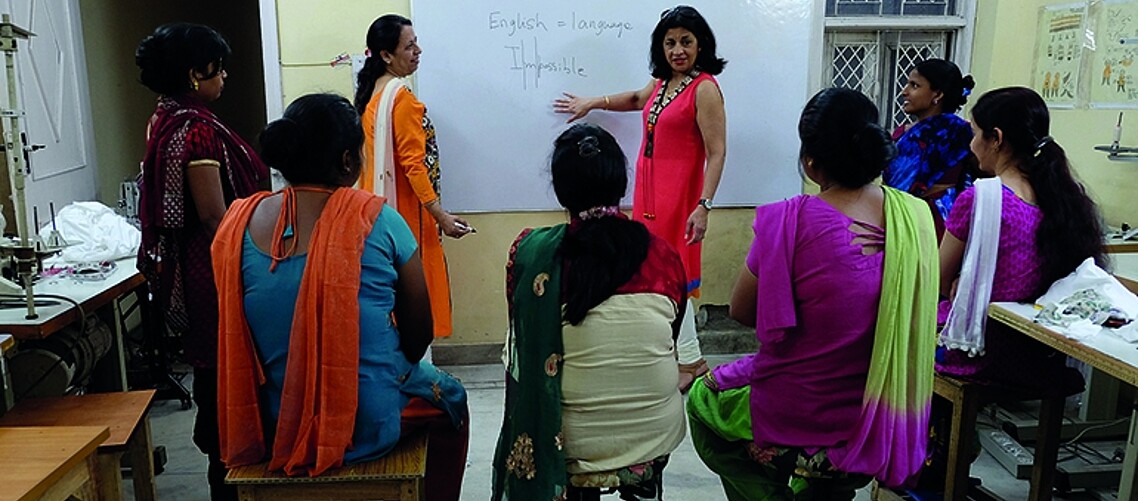Namita is the co-founder of a multi-pronged programme that has proved over the last five years that sound business principles can be effectively applied to social enterprise. Unlike traditional business approaches, the metrics of success used by Namita’s programme go beyond the purely financial.
‘I was visiting a family in India and the father proudly told me that his eldest child attended school. This child was eight years old but looked four. My god, I thought, how can I provide vocational training to a malnourished family? How can they learn without a decent meal a day? Brain cells need food,’ she says.
This is a vital point; it illustrates the interdependency between multiple factors that must be addressed to alleviate poverty and empower people at the grass-roots level. Addressing these complex elements in a single place, with a comprehensive programme, is precisely what WORK+SHELTER does.
Creating opportunities
At its core, WORK+SHELTER provides marginalised women in India with vocational skills and the means to provide themselves and their families with the basic human requirements of food, shelter and safety. However the programme goes beyond simply holding a few classes to teach skills that may or may not be useful in the wider world. WORK+SHELTER partners with businesses across the Netherlands and the United States, fulfilling manufacturing orders, offering an ethical manufacturing solution for businesses, and creating opportunities for the women served by WORK+SHELTER.
Companies that support social enterprise are lining up to use the skills of WORK+SHELTER’s workforce and it’s proving so advantageous for all that immediate expansion is needed. ‘To expand, to provide training to 100 marginalised women over the coming year, we need seed money,’ she says. ‘I would love to get support and resources from multinational businesses like Ikea!’
Namita’s soft-spoken demeanour and easy humour are at odds with her sharp business acumen and privileged background. The Australian-born daughter of an Indian diplomat, Namita could easily have trodden the well-worn linear path of graduation, career and family that many have walked before her. Instead she took the road less travelled, moving across career paths in widely varying business verticals with barely a blink.
Insatiably curious by nature and a global citizen by nurture, Namita is frank about her feeling of obligation to those less fortunate: ‘I was born with a silver spoon in my mouth. That means I have a responsibility. Why did I choose to help marginalised Indian women? Because I could have been one.’
Partnering potential
Similar programmes with potential partnerships between successful companies and local NGOs in India are screened by New Yardsticks, the first enterprise spearheaded by Namita. New Yardsticks is named for what Muhammad Yunus, the grandfather of micro-lending for social enterprise, described when he talked about a new set of metrics for business success; metrics that measure social return on investment and go beyond only financial profitability.
The company uses a combination of Social Return on Investment and the 5A model set forth in Namita’s MBA thesis. These standards assess a potential project before inception as well as a project’s impact, based on its marketability, accessibility to all stakeholders, and with a strong focus on risk management.
‘There is an orphanage in India that had space for expansion. The children were happy – actually happy, in an orphanage! But the managers were worried about what would happen when the older children turned eighteen. They were also looking for ideas on how to use the space they had for expansion,’ she says.
‘After screening the possibilities I recommended that they build a construction company and utilise the resources they already have – teach the older children the practical skills they need to become engineers, architects, carpenters and administrators. Make a test case from the construction company that builds on your expansion space. Create the jobs, teach the skills.’
Doing more
And herein lies the crux of Namita Taneja Krul’s philosophy and proven model. ‘If you start a centre to train these women, it’s not enough to just give the training. You must have a constant flow of orders. If you just give skills but don’t do anything with those skills then nothing happens. A set of distribution channels creates jobs and jobs create returns [beyond traditional ways of measuring success].
‘You can’t just sit behind a sewing machine; you must have an order to fill. And when you have this you have a peer group. You have a network, a social group. When we created WORK+SHELTER and one woman was in hospital, the other women helped her – they took care of her family, they helped her recover,’ she says.
‘You give a person a skill and you can say, “yes, I gave her financial empowerment”. But if you also give her a safe place, nourishment, friends, a peer group, goals, and escape from abuse at home… then you can also say you have created a social return. These are the new yardsticks of social entrepreneurship.’
To support Namita's work and develop or create sustainable partnerships that will expand her reach to empower thousands of marginalised women in India, please contact her and her team at: info@workshelter.org or info@newyardsticks.nl
